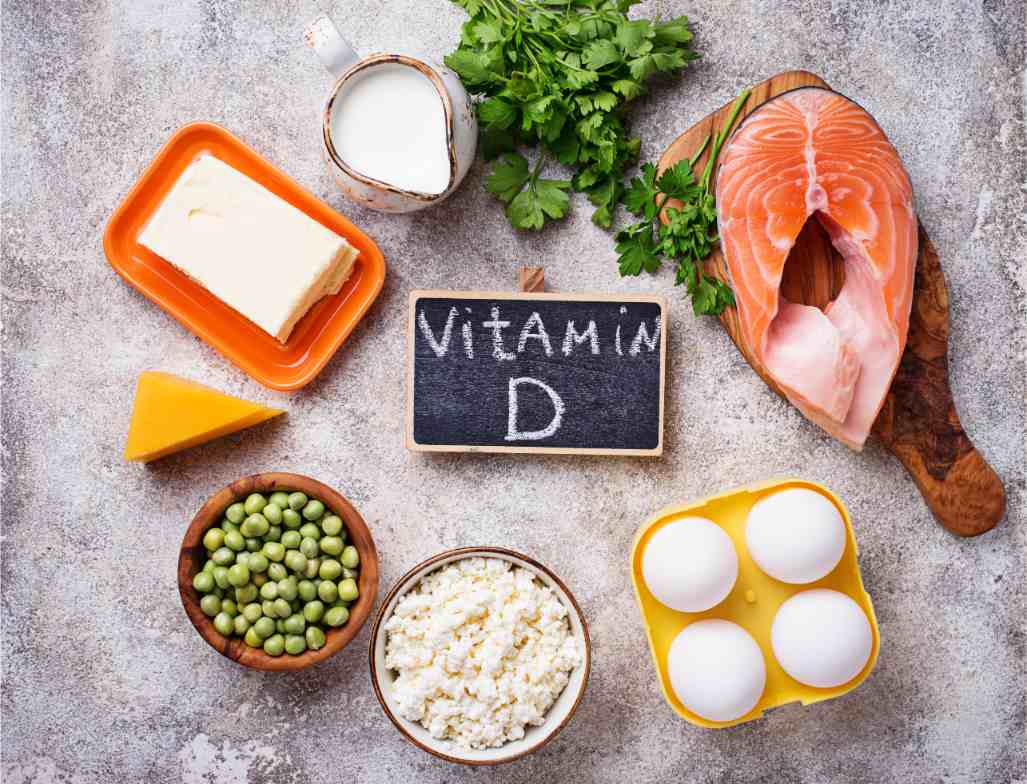13 Types of Vitamins and Healthy Food Sources to Include in Your Diet

The human body requires a proper combination of nutrients for healthy functioning. Excess or lack of anyone may lead to health concerns, mild to fatal. Vitamins make up a large part of these essential components.
Detailed knowledge of the different types of vitamins can help you ensure a diet with adequate proportions of these nutrients. Here is a detailed discourse on what vitamins are and the different types of vitamins to help you understand better.

Table of Contents

What is a Vitamin?

Vitamins are a group of essential nutrients that the human body requires for normal cell function, development and growth, and maintaining proper health. These organic compounds are present in small quantities in several food items.
Humans need to consume all types of vitamins from these eatables to ensure nutrient balance, as our bodies do not naturally synthesise them. A deficiency of these nutrients can lead to numerous health problems, ranging from mild to fatal.
Different Types of Vitamins
Vitamins are classified based on solubility, which can take two forms. Knowing the different types of vitamins can help people choose what to eat.
Fat-Soluble Vitamins
Vitamin A
Vitamin D
Vitamin E
Vitamin K
Water-Soluble Vitamins
- Vitamin C (Ascorbic Acid):
- B Vitamins:
- B1 (Thiamine)
- B2 (Riboflavin)
- B3 (Niacin)
- B5 (Pantothenic Acid)
- B6 (Pyridoxine
- B7 (Biotin)
- B9 (Folate/Folic Acid)
- B12 (Cobalamin)
Functions of Different Vitamins

Many biological processes require vitamins. They all have various roles ranging from supporting immunity and vision to promoting energy production and blood clotting. The significance of these functions lies in maintaining balanced nutrition.
Fat-Soluble Vitamins
- Vitamin A: It supports vision by maintaining the health of the retina. It is also vital for immune system function, cell growth, and differentiation, which are critical in forming the heart, lungs, kidneys, and other organs.
- Vitamin D: Facilitates calcium absorption in the gut, promoting bone and dental health. It is also involved with immune system regulation and reducing inflammation.
- Vitamin E: It acts as an antioxidant, protecting cells from oxidative stress caused by free radicals and supports immune function and skin health.
- Vitamin K: Essential for the synthesis of proteins required for blood clotting and bone metabolism. Prevents excessive bleeding and supports strong bones.
Water-Soluble Vitamins
- Vitamin C (Ascorbic Acid): Promotes tissue repair & regeneration, enhances iron absorption, boosts immunity & acts as an antioxidant.
- B Vitamins
- B1 (Thiamine): Helps convert carbohydrates into energy, which is crucial for nerve function, muscle contraction & heart function.
- B2 (Riboflavin): It plays a key role in energy production at the cellular level, growth, and development. It also helps maintain healthy skin and eyes.
- B3 (Niacin): Supports metabolic processes and DNA repair. It is also involved in the production of sex and stress-related hormones and promotes healthy skin and nerves.
- B5 (Pantothenic Acid): Involved in coenzyme A synthesis, crucial for fatty acid metabolism, and plays a role in producing red blood cells and steroid hormones.
- B6 (Pyridoxine): It is important for amino acid metabolism, neurotransmitter synthesis, red blood cell production, and normal blood homocysteine levels.
- B7 (Biotin): It supports metabolic processes involving fats, carbohydrates, and proteins and maintains healthy hair, skin, and nails.
- B9 (Folate/Folic Acid): Crucial for DNA synthesis, cell division, and the proper development of the foetal nervous system during pregnancy.
- B12 (Cobalamin): It is essential for red blood cell formation, neurological function, and DNA synthesis. It also helps maintain healthy nerve cells.
What are the Different Sources of Vitamins?

Vitamins are essential components that our bodies need to work properly. Since humans either produce them insufficiently or don’t produce them at all, they must be obtained from diverse kinds of food.
Found only in certain foods, each vitamin has its source, which is important for adequate consumption.
Vitamins |
Sources of Vitamins |
| Vitamin A | Carrots, sweet potatoes, spinach, kale, fish liver oils |
| Vitamin D | Sunlight exposure, fortified milk, fatty fish (salmon, mackerel), egg yolks |
| Vitamin E | Nuts, seeds, green leafy vegetables, vegetable oils, fortified cereals |
| Vitamin K | Leafy green vegetables (kale, spinach), broccoli, Brussels sprouts, vegetable oils |
| Vitamin C | Citrus fruits (oranges, lemons), strawberries, bell peppers, broccoli, Brussels sprouts |
| B1 (Thiamine) | Whole grains, pork, fish, legumes, nuts |
| B2 (Riboflavin) | Dairy products, eggs, green leafy vegetables, meat, fortified cereals |
| B3 (Niacin) | Poultry, fish, lean meats, peanuts, fortified cereals |
| B5 (Pantothenic Acid) | Chicken, beef, potatoes, oats, tomatoes, whole grains |
| B6 (Pyridoxine) | Fish, beef liver, potatoes, starchy vegetables, non-citrus fruits |
| B7 (Biotin) | Eggs, almonds, spinach, sweet potatoes, liver |
| B9 (Folate/Folic Acid) | Leafy green vegetables, legumes, fortified cereals, citrus fruits |
| B12 (Cobalamin) | Meat, fish, dairy products, eggs, fortified cereals |
Useful Tools to Track Your Health
What are the Diseases Caused by Vitamin Deficiency?
Vitamin deficiencies influence various body functions and cause various health problems. Each vitamin has a specific role in maintaining good health, and disease or symptoms may result from a lack of a particular element.
The following are some diseases caused by deficiency in different vitamins.
Fat-Soluble Vitamin Deficiencies
- Vitamin A Deficiency
- Diseases: Night blindness, xerophthalmia (dry eyes), and an increased risk of infections.
- Symptoms: Vision problems, dry skin, weakened immune function.
- Vitamin D Deficiency
- Diseases: Rickets (in children), osteomalacia (in adults), osteoporosis.
- Symptoms: Bone pain, muscle weakness, increased risk of fractures.
- Vitamin E Deficiency
- Diseases: Peripheral neuropathy, ataxia, retinopathy, immune system impairment.
- Symptoms: Muscle weakness, coordination problems, vision issues.
- Vitamin K Deficiency
- Diseases: Increased bleeding and bruising, hemorrhagic disease of the newborn.
- Symptoms: Easy bruising, excessive bleeding from wounds or surgical sites.
Water-Soluble Vitamin Deficiencies
- Vitamin C (Ascorbic Acid) Deficiency
- Diseases: Scurvy.
- Symptoms: Swollen gums, joint pain, anaemia, fatigue, and poor wound healing.
- B Vitamins Deficiency
- B1 (Thiamine) Deficiency
- Diseases: Beriberi, Wernicke-Korsakoff syndrome.
- Symptoms: Weight loss, emotional disturbances, impaired sensory perception, weakness, and pain in the limbs.
- B2 (Riboflavin) Deficiency
- Diseases: Ariboflavinosis.
- Symptoms: Sore throat, redness and swelling of the mouth and throat lining, cracks or sores on the outsides of the lips (cheilosis) and at the corners of the mouth (angular stomatitis).
- B3 (Niacin) Deficiency
- Diseases: Pellagra.
- Symptoms: Diarrhoea, dermatitis, dementia, and if left untreated, death.
- B5 (Pantothenic Acid) Deficiency
- Diseases: Rare, but can cause burning feet syndrome.
- Symptoms: Fatigue, irritability, numbness, and muscle cramps.
- B6 (Pyridoxine) Deficiency
- Diseases: Anaemia, peripheral neuropathy.
- Symptoms: Dermatitis, cracked and sore lips, inflamed tongue, confusion, depression, and weakened immune function.
- B7 (Biotin) Deficiency
- Diseases: Rare, but can cause hair-thinning skin rash.
- Symptoms: Hair loss, scaly red rash around eyes, nose, mouth, and genitals.
- B9 (Folate/Folic Acid) Deficiency
- Diseases: Megaloblastic anaemia, neural tube defects in pregnancy.
- Symptoms: Fatigue, mouth sores, tongue swelling, poor growth, and infant developmental problems.
- B12 (Cobalamin) Deficiency
- Diseases: Pernicious anaemia, neurological disorders.
- Symptoms: Fatigue, weakness, constipation, loss of appetite, weight loss, and neurological changes such as numbness and tingling in the hands and feet.
- B1 (Thiamine) Deficiency
Side Effects of Overconsumption of Different Vitamins
While vitamins are essential for health, overconsumption can lead to toxicity and unwanted health effects. The fat-soluble vitamins—A, D, E, and K—are especially problematic when overdosed as they get stored in the body’s fatty tissues and liver. Here are the potential side effects of excessive intake:
- Vitamin A
- Toxicity: Hypervitaminosis A.
- Symptoms include nausea, headache, dizziness, blurred vision, liver damage, bone pain and skin changes. In extreme cases, birth defects can happen if a high amount is taken during pregnancy.
- Vitamin D
- Toxicity: Hypervitaminosis D
- Symptoms are hypercalcemia (high calcium levels in the blood), which can cause nausea, vomiting, weakness, frequent urination and kidney damage.
- Vitamin E
- Toxicity: Rare but high doses can interfere with blood clotting causing haemorrhage.
- Symptoms include an increased risk of bleeding, especially in people who take medications that thin the blood, such as aspirin or warfarin.
- Vitamin K
- Toxicity: It is rare and seldom harmful, but it may interfere with anticoagulants, which reduce the ability of the blood to clot.
- Symptoms are related to abnormal clotting processes taking place within the body system.
- Vitamin C (Ascorbic Acid)
- Toxicity: Rare but may occur at elevated doses.
- Symptoms include diarrhoea, nausea, stomach cramps, development of kidney stones.
- B Vitamins
Vitamin B supplements are not dangerous, but excessive intake may cause other symptoms. Here are the leading health problems one may face by taking massive amounts of vitamin B.- Skin conditions: Niacin (B3) can cause reddening, itching and a burning sensation on your skin. Acne can occur as an adverse effect of high doses of biotin (B7).
- Digestive issues: Every B vitamin, if taken in large amounts, causes upset stomachs with vomiting, nausea, diarrhoea, and abdominal pains.
- Nerve harm: Toxicity from vitamin B6 can cause nerve damage in the hands and feet, resulting in numbness, tingling, or pain.
- Liver damage: Ingesting very high quantities of niacin might injure the liver.
It is important to understand the two major classifications of vitamins: fat-soluble and water-soluble. Combining diverse foods rich in various vitamins will ensure your body acquires all the necessary nutrients for normal activities. Therefore, remember: a balanced diet! If you have any problems while trying to meet vitamin requirements, consult a medical practitioner who can develop an individual diet plan.
Explore Health Insurance Options For Better Tomorrow










